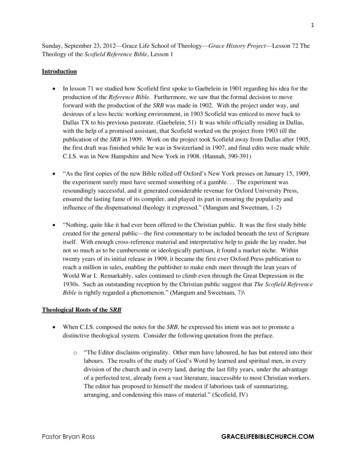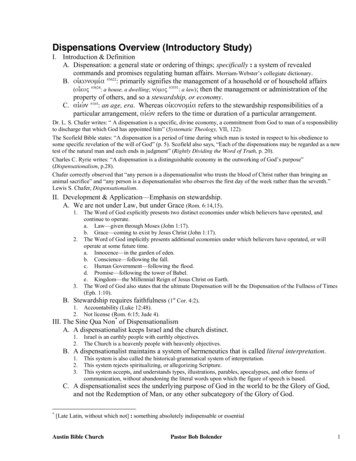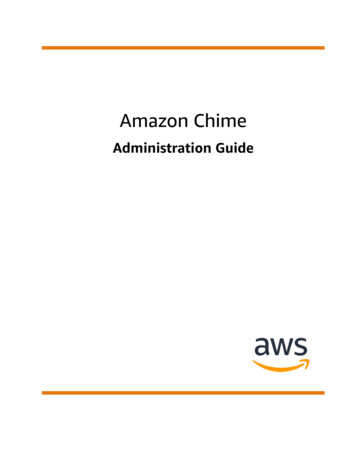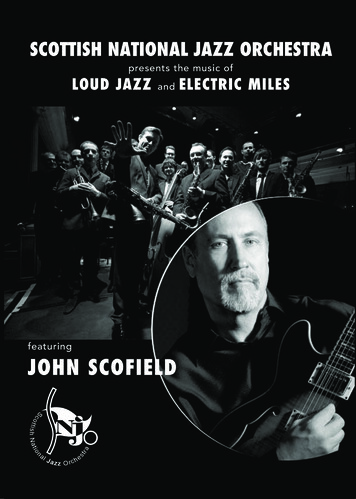
Transcription
SCOTTISH NATIONAL JAZZ ORCHESTRApresents the music ofLOUD JAZZandfeaturingJOHN SCOFIELDSconJazstrat ti s h N a ti oalz OrcheELECTRIC MILES
When Miles Davis hiredJohn Sco eld in 1982 hewas adding a guitaristwith real blues feeling aswell great jazz chops to aband that was wowing audiences worldwide with at least one of the tunes youare going to hear tonight, Jean Pierre,whose simple melody and structureare ripe for exploration and expansion.For Sco eld, this was the most prestigiousstaging post to date in a career that hadalready included work with jazz legendsGerry Mulligan, Chet Baker, Charles Mingus and Gary Burton and it was the gigthat would establish him, alongside PatMetheny and Bill Frisell, as one of thethree most distinctive-sounding and in uential jazz guitarists of their generation.Sco eld had come to jazz as Davis’s embracing of rock and funk rhythms in the late 1960sgrew into an electric storm that drew listeners previously unaware of jazz into the musicin varying degrees. Some concentrated onthe development of fusion into the 1970sand onwards. Others like Sco eld, however,who had taken up guitar at high school inConnecticut, inspired by rhythm and bluesand soul music, delved into the history ofjazz and quickly became immersed in themusic’s mainstream while continuing to nd excitement in improvising on bluesand jazz scales over a rock and funk pulse.Having studied at Berklee College of Musicin Massachusetts and played around theBoston area, he recorded a live album withMulligan and Baker – at Carnegie Hall, NewYork, no less – and joined the group in whichhe made his rst big impression internationally, the Billy Cobham-George Duke Band.Here among a repertoire that featuredheavy duty rif ng, scarily accomplished ensemble playing and nutty, irreverent humourthat Duke had carried over from his yearswith Frank Zappa, Sco eld attracted fansthrough his direct and exhilarating soloing.It’s a style he has focused on many times inthe thirty- ve years since then, notably in hisband with drum sensation Dennis Chambersand on albums such as Time on My Handsand Meant to Be, which between themproduced Wabash the Third, Since YouAsked, and Go Blow, all of which have beenspecially arranged for tonight’s concert.What makes Sco eld particularly appealing,however, is the breadth of his work and hisability to approach, with the same depth offeeling, the pastoral beauty of his Gil Evanslike album Quiet; the return to his R&B rootsof Green Tea, whose dancing New Orleansgroove the Scottish National Jazz Orchestra’s drummer, Alyn Cosker, is just going tolove laying down here; his engagement withelectronic loops and street rhythms on UpAll Night; his adventures into soul-jazz withEddie Harris; and his appreciation of straightahead values that informed his 1990s recordings with saxophonist Joe Henderson.There is one other very signi cant strand inSco eld’s musical character that goes backto his return to acoustic jazz after the Cobham-Duke band when he formed a partnership with bass guitarist Steve Swallow thathas continued through a full and very diversecareer that now runs to thirty- ve years andcounting. Sco eld’s trio work with Swallow,beginning with the album Shinola and carrying on through the delightfully punning BarTalk, highlight a vocal quality in his guitarplaying that Miles Davis must have appreciated as much as his blues feeling and thatmakes the man they call “Sco” the perfectvoice to feature as soloist on the song-like,latter day Miles classics Tutu, Splatch andthat French nursery rhyme that you maywell leave the hall singing, Jean Pierre.
1st SETLOUD JAZZWABASH THE THIRDarr. Christian JacobGROOVE ELATIONarr. Mike GibbsSINCE YOU ASKEDarr. Manu PekarGREEN TEAarr. Geoffrey KeezerGO BLOWarr. Florian Ross2nd SETELECTRIC MILESDIRECTIONSarr. Pino JodiceJEAN PIERREarr. Makoto OzoneWHAT IT ISarr. Paul HarrisonTUTUarr. Michael AbeneSPLATCHarr. Fred SturmArrangements commissioned bythe SNJO with subsidy from theScottish Arts Councilmusic byJOHN SCOFIELDMILES DAVISMARCUS MILLER
P[ w w w . p i n o i o d i c e . c o m ]INO JODICE born in Naples in 1965, studied classical piano and received his classical piano diploma in 1987. All the time hewas studying classical music, however, he wasalso showing an interest in jazz. He joined summer workshops with leading Italian pianist FrancoD’Andrea, in Siena, and studied jazz arrangementat Berklee College of Music in Boston. He nowteaches at the St Cecilia Conservatory of Musicin Rome and at the Conservatory Martucci inSalerno. His many awards for composition andarrangement include rst prizes at Castel DelMondi and Barga and Positano jazz festivals andhe will already be familiar to Scottish NationalJazz Orchestra audiences through his grippingand panoramic fantasia based on John Coltrane’sSatellite, at SNJO’s Coltrane tribute concert atGlasgow Jazz Festival 2007, and for his compelling arrangements of animated lm favouritesfor SNJO’s Jazz Toons concert series in 2008.Aside from his teaching, composing and arranging commitments, Pino leads his own trio andquintet, which has recorded with special guests,saxophonists Dick Oatts and Tommy Smith, andco-leads the Giuliana Soscia & Pino Jodice ItalianTango Quartet. He’s also pianist, arranger andcomposer of the Parco della Musica Jazz Orchestra of Rome.FLORIAN ROSS born in 1972, studiedpiano and composition with John Taylor,Bill Dobbins, Joachim Ullrich, Jim McNeelyand Don Friedman at the Hochschule für Musikund Tanz, Cologne, at the Guildhall School ofMusic & Drama, London and at New York University. Since 1998 he has released seven albumsfeaturing both small and large ensembles, andhas written approximately one hundred compositions and arrangements for large jazz ensembles.As well as various other prizes, he received theprestigious Thad Jones Composition Competition Award in 2000 and won the WDR JazzComposition prize in 2006. His commissionedworks include pieces for the German NDR andWDR big bands, the Netherlands Metropole Orchestra, the BBC Big Band, the Danish Radio JazzOrchestra, RTE Irish Radio Orchestra, and SydneyMothership Jazz Orchestra and artists includingDavid Liebman, John Sco eld, George Duke, andGary Burton. SNJO regulars will remember Ross’sA Day in the Life commission in 2002 and his brilliantly imaginative arrangements of Giant Steps,Crepuscule with Nelly and Humpty Dumpty forSNJO’s Coltrane, Monk and Corea tributes. Inaddition to writing and touring with his own trioand Nils Wogram’s Nostalgia, Ross teaches pianoand composition at the Hochschule für Musikund Tanz in Cologne.[ w w w . f l o r i a n r o s s . d e ]
GEOFFREY KEEZER born in Eau Claire,Wisconsin in 1970, grew up in a musicalfamily, with both parents music teachers,and began studying piano aged three. In 1989,after completing his rst year at Berklee Collegeof Music in Boston, he joined Art Blakey’s JazzMessengers. Since then, he has worked with virtually all of jazz’s living legends and has appearedon countless recordings both as a leader and asan accompanist. His career has spanned manyprojects and genres. He has had compositionscommissioned by the Carnegie Hall Jazz Band,Saint Joseph Ballet, Mainly Mozart Festival inSan Diego, and the Zeltsman Marimba Festivaland was a recipient of Chamber Music America’s2007 New Works grant. He has also played bassin a rock band and contributed artwork to DavidMack’s comic Kabuki. Keezer’s composition andarranging talents will be familiar to the ScottishNational Jazz Orchestra audience through hisSouth Alaska Suite, which was commissionedspecially by SNJO and premiered in February2005. He also contributed arrangements toSNJO’s John Coltrane and Chick Corea tributes.His latest project, Áurea, is a highly acclaimedadventure into South American folkloric music,featuring collaborators from Peru, Argentina andNew York.[ w w w. g e o f f r e y k e e z e r. c o m ]CHRISTIAN JACOB born in Lorraine,France, began classical piano studies atthe age of four and went on to study withPierre Sancan at the Paris Conservatory. Havingheard Oscar Peterson and Dave Brubeck whenhe was nine or ten, he played jazz as a hobbythroughout his Conservatory years but then,having become one of the youngest students tograduate from the Conservatory, he decided tochange allegiances. Without knowing a word ofEnglish he moved to the United States to studyjazz at Berklee College of Music, where he won anumber of awards, including the Oscar PetersonJazz Masters Award, the Great American JazzPiano Competition and Down Beat magazine’sdistinction as Top Collegiate Jazz Soloist. Hejoined the Berklee faculty as a piano tutor ongraduating in 1985, subsequently toured withGary Burton and as musical director with trumpeter Maynard Ferguson’s Big Bop NouveauBand, and recorded the rst of his ve trio CDsfor Concord Records, with Peter Erskine andJohn Patitucci, in 1997. He has since worked withFlora Purim & Airto Moreira, Phil Woods and BillHolman and has composed and arranged for bigbands and orchestras, including the BangkokSymphony.[ w w w. c h r i s t i a n j a c o b . c o m ]
F[ w w w . f r e d s t u r m . c o m ]MAKOTO OZONE Born in Kobe, Japan,in 1961, Makoto began playing organaged four and switched to piano attwelve. He attended Berklee College of Musicfrom 1980 to 1983, studying Jazz Compositionand Arranging. On graduating he immediatelyjoined vibraphonist Gary Burton’s group andsigned a worldwide recording contract with CBS,releasing a self-titled debut album and making his Carnegie Hall debut the same year. Heformed his rst trio with bassist Kiyoshi Kitagawaand drummer Clarence Penn in 1996 and released The Trio album on Verve, winning SwingJournal magazine’s Best Jazz Trio Album of theYear award. As well as playing and composingjazz, Makoto has performed classical music, including Gershwin, Bernstein, Beethoven, Mozart,and his own piano concerto, Mogami, with internationally known conductors such as CharlesDutoit, Tadaaki Otaka, Eiji Oue, and MichiyoshiInoue and orchestras including Sinfonia Varsovia,NDR Hamburg, New Japan Philharmonic, andSapporo Symphony Orchestra. His 2002 duet album of classical pieces with Gary Burton, Virtuosi,received a Grammy nomination in the ClassicalCrossover section. In 2004, Makoto gathered anelite group of Japanese jazz musicians to formthe big band No Name Horses, which has touredinternationally and made a stunning appearanceat EIJF in 2009.RED STURM is a proli c composer andarranger who combines his position as Director of Jazz and Improvisational Music atthe Lawrence University Conservatory of Music inAppleton, Wisconsin with guest conducting rolesin Germany, Italy, Denmark, Sweden, and Norwayand various directorships, composer-in-residencies and educational commitments throughoutthe United States. Regular SNJO concertgoerswill know Fred’s work through the orchestra’sSteely Dan and Astor Piazzolla projects. But thisis just scratching the surface of his industry. Bornjust outside Chicago to musical parents – hisfather played cello with the Chicago SymphonyOrchestra and his mother was a professionalsinger – Fred abandoned piano, cello and violinlessons in short order before settling on trumpetaged fteen. He then became hooked on bigbands, especially the Herman, Rich and Kentonmodels, and before entering jazz education, hespent four years on the road as a professionalmusician. His compositions and arrangementshave been performed by jazz, orchestral, wind,choral, and chamber ensembles worldwide andhave featured Wynton Marsalis, Bob Brookmeyer,Clark Terry and Phil Woods. Fred’s recent work includes a two-hour suite for singer Bobby McFerrin featuring indigenous music from twenty-onecountries and a ‘nine-inning’ baseball symphony,Forever Spring.[ w w w . m a k o t o o z o n e . c o m ]
J[ w w w . p a u l h a r r i s o n . i n f o ]MANU PEKAR born in Paris in 1955, grewup listening to his parents’ record collection. His mother, a classically trainedviolinist, liked New Orleans and swing, especiallyDjango Reinhardt, and his father favoured MilesDavis, Dave Brubeck and the Modern Jazz Quartet. In his teens, inspired by groups includingPink Floyd, Jethro Tull and Santana, Pekar tookup guitar. He played with rock bands and studiedwith the great French guitarist Frederic Sylvestreand after gaining a masters degree in Physics andMathematics, he decided to pursue music as acareer. He studied at Berklee College of Musicfrom 1984-1987 and soon afterwards recorded his rst album for CBS/Sony, featuring special guest,saxophonist Dave Liebman. He has since workedwith saxophonists Larry Schneider and RickyFord, among many other musicians, and has written music for a variety of ensembles, includingwoodwind trio, jazz big band and string sextet.Pekar has also written music for stage plays and lm soundtracks, including Paulo Antunes’ GuNian, and contributed distinctive arrangementsof Tones for Joan’s Bones and Acknowledgement to SNJO’s Chick Corea and John Coltranetributes. He is currently director of the Jazz andImprovisational Music department at the National Conservatory of Music in Reims, France.azz pianist, hammond organist, composerand arranger Paul Harrison was born inManchester, England. As a youth he constantly showed an adeptness and interest inmusical directions beyond (and counter to)where his teachers were leading him, and he wasimprovising long before he was exposed to jazz.He settled in Scotland after entering EdinburghUniversity on a prestigious piano scholarship,where, during his nal year he was awarded theTovey Memorial Prize. After graduating he turnedaway from his classical background while immersing himself in the burgeoning and supportiveScottish jazz scene. He won the Scottish regional nal of the Young Jazz Musician of the Year competition in 1998 and again in 1999, both yearsgoing on to compete as one of six British nalistsin London. In recent years Paul has been calledon to play with many great outstanding international performers, including Chris Potter, DavidBinney, Bobby Watson, Jesse Davis, Lea DeLaria,Joe Locke, Ulf Wakenius and Warren Vache. Hisgrowing interest in electronic music and freeimprovisation led him to co-found the groupTrianglehead, an avant-garde brew of arrestingsonics, trio interaction and acoustic exploration.In 2009 Paul won the award for Best Pianist atthe rst Scottish Jazz Awards ceremony, and nowteaches on Scotland’s Jazz degree course at theRoyal Scottish Academy of Music and Drama.[ w w w . m a n u p e k a r . f r e e . f r ]
MICHAEL ABENE currently musicaldirector and principal arranger for theWDR Big Band in Cologne, has had aneventful career since joining Maynard Ferguson’sband as a teenager in 1961. While with Fergusonhe wrote many arrangements, including OnGreen Dolphin St, Whisper Not and Airegin,before going on to work with, among many othermusicians, Bill Evans, Gary Burton, Jon Faddis,James Moody, Take 6, Mike Stern, Maceo Parkerand Paquito D’Rivera. In 1986, Abene began anaf liation with GRP Records, producing manyof the company’s most successful recordings,including the Grammy-winning Digital Duke andthe three GRP All-Star Big Band albums whichwere all Grammy nominated and for each ofwhich he received personal nominations as arranger. He enjoyed further Grammy success withthe WDR Big Band for producing and arrangingPatti Austin’s 2007 album, Avant Gershwin, andwas again nominated in the arranger categoryin 2009 for Joe Lovano’s Symphonnica album,which featured the WDR Big Band and the WDRRundfunk Orchestra. He has also written for andconducted the Metropole Jazz Orchestra and theCarnegie Hall Jazz Band and continues to teachjazz composition at Manhattan School of Musicand to selected students in the Cologne area.MIKE GIBBS composer, arranger andtrombonist has worked with many music luminaries, including Pat Metheny,John McLaughlin, John Sco eld, Narada MichaelWalden, Michael Mantler, Gary Burton, WhitneyHouston, Peter Gabriel and Bill Frisell. Bornin Salisbury, Southern Rhodesia (now Harare,Zimbabwe), he grew up playing trombone andpiano and was awarded scholarships to attendLenox School of Jazz and Tanglewood SummerSchool, where he studied with Gunther Schuller,George Russell, J.J. Johnson, Lukas Foss, andIannis Xenakis. Having graduated from BerkleeCollege of Music with a diploma in arrangementand composition in 1962, he moved to the UK,played trombone for Tubby Hayes, Graham Collier, John Dankworth and Cleo Laine, and by thelate 1960s was generally recognised as one of theleading young composer-arrangers in jazz. Hisalbums, including Michael Gibbs and In the Public Interest, won him numerous awards and afternine years as composer-in-residence at Berklee,during which time he orchestrated Joni Mitchell’sDon Juan’s Reckless Daughter album amongmany others, he returned to the UK in 1985. Hehas since written extensively for lms and television and worked with the NDR and WDR bands inGermany, and in 2004 received an Honorary Fellowship from Birmingham Conservatoire.p h o t o : [ w w w. s t e v e n h a b e r l a n d . c o m ]
S C O T T I S HN A T I O N A LThe great saxophonist Joe Henderson used tosay that a jazz orchestra should have all the colour and power of a big band and yet be as mobile as a quartet. While regularly paying heed toHenderson’s wishes since playing its rst concertsin 1995, the Scottish National Jazz Orchestra hasadded another quality by being as malleable asPlasticine.Smith’s vision, energy and musical knowledge andan appetite for unseen hard work that borders onthe heroic have given, in SNJO and its feederband, the Tommy Smith Youth Jazz Orchestra, themusicians who followed his generation a platformon which to demonstrate their abilities and have,in many cases, provided a launching pad for theircareers. Some have already moved on - bassistAidan O’Donnell and drummer John Blease, nowNew York and London-based respectively, springreadily to mind. Yet the high standard of performances has been consistently maintained.Under the sure direction of Tommy Smith, SNJOhas moulded and remoulded itself into theshape and character of the classic big bands ofEllington, Basie, Kenton and Herman and movedforward to interpret Monk, Mingus and Coltranein the spirit of these idiosyncratic giants. It hastaken further leaps into the Latin American androck infused compositions of Chick Corea andPat Metheny and proved its astonishing versatility by commissioning and performing brave newworks by the English maverick Keith Tippett, theGil Evans of our times, Maria Schneider, andmembers of the orchestra themselves.The many top line musicians and composerswith whom SNJO has worked will attest to this.Sir John Dankworth and Dame Cleo Laine, topAmerican saxophonists Joe Lovano, David Liebman and Bobby Watson, and guest directorsincluding German composer Florian Ross andAmerican pianist Geoffrey Keezer as well as theaforementioned Tippett and Schneider have allbeen unstinting in their praise of the orchestra.In charting some eighty years of jazz progress- and admittedly indulging in the not quite soenvironmentally friendly use of an awful lot ofmanuscript paper - SNJO has also own the agfor Scotland at home and further a eld at a timeof tremendous growth in the quality and quantityof the country’s young jazz musicians.Anyone who has followed SNJO’s progress, as ithas metamorphosed from being the vehicle forOliver Nelson’s sophisticated creations to playinga robust Ray Charles Orchestra to Tam White’sBrother Ray to sparking mischief and mayhem incelebrating Scottish locations and football managers, will not be short of highlights.Scotland has produced world class jazz musiciansthroughout jazz’s history. Trombonist GeorgeChisholm recorded with Fats Waller in the 1930s.Trumpeter Jimmy Deuchar’s playing, composingand arranging abilities were appreciated on bothsides of the Atlantic from the 1950s onwards.Bobby Wellins, a genuinely original jazz voice ontenor saxophone, recorded one of the landmarkjazz albums of the 1960s and continues to be aninspiration. And his fellow Glaswegian Jim Mullen used to bemuse New Yorkers who praised hisguitar playing with the groovy, downtown Manhattan version of Morrissey-Mullen by thankingthem in an accent far removed from the Bronx,Chicago or Memphis in ections they were expecting.Among some of the most memorable is surelythe trumpet section doing a terri c job as ferociously mewling alley cats during a tribute toCharles Mingus that captured all the brawling,bawling magni cence and gospel- red blues ofthis twentieth century genius. There was also thesheer spectacle of seeing Alyn Cosker, who wastwo months old when Stan Kenton died, steering the band with total awareness of the music’severy ne detail as if he’d been the master’s lastdrummer. More recently, in 2007 there was aneloquent illustration of Tommy Smith’s point thatcommissioning arrangements of familiar musiccan be tantamount to creating new compositionsas SNJO marked the fortieth anniversary of JohnColtrane’s death.Since the mid 1980s and his teenage years withGary Burton’s band Tommy Smith has been aprominent Scot on the world jazz stage, althoughhe’d be the rst to mention that he hasn’t beenalone in a generation that also produced BrianKellock, Colin Steele, John Rae, Kevin Mackenzieand the Bancroft twins - all of whom have madean international impact.2008 saw further evidence of the Plasticine-likepliability alluded to above as, rst, SNJO broughtthe music from animated lms such as JungleBook, The Flintstones and Beauty and the Beastto almost pictorial life with the help of Italian arranger Pino Jodice and guest singer MaureenMacMullan.
J A Z ZThe orchestra then triumphed as the Steely DanBig Band, with guitarist Graeme Scott and bassguitarist Kevin Glasgow joining SNJO’s team ofoutstanding soloists in celebrating one of thegreat rock music repertoires with great jazz application, before giving a convincing performance ofLatin American music by Argentinean new tangomaster Astor Piazzolla, Brazilian bassist-composerMario Caribe and Venezuelan pianist Leo Blanco.This year has already seen further triumphs,including more evidence of drummer AlynCosker’s ability to ll big shoes in Traps the DrumWonder, a celebration of Buddy Rich, and theorchestra’s enthusiastically acclaimed secondalbum release, Rhapsody in Blue Live, which wasfollowed by SNJO winning the Best Big Bandcategory of the inaugural Scottish Jazz Awards.O R C H E S T R AIt has been a busy time on the recordingfront for SNJO members, too, as Coskerand saxophonist Paul Towndrow have followed trumpeter Ryan Quigley in releasing albums that con rm Scotland’s status asa producer of jazz of international quality.In continuing to play their parts with dedicationand improvise with passion, heart andimagination, however, all the members ofSNJO, individually and collectively, can standproudly as Scotland’s leading jazz ambassadors.ROB ADAMS
TOMMY SMITHBorn in Edinburgh in 1967, Tommy won bestsoloist and best group titles at Edinburgh International Jazz Festival, aged 14, and recordedhis rst album at 15. After studying at BerkleeCollege of Music he joined Gary Burton’s group,touring worldwide and recording the Whiz Kidsalbum on ECM. He signed to Blue Note Recordsin 1989, later moving to Linn Records beforeforming his own Spartacus label. He has nowreleased twenty-three solo albums, includingThe Sound of Love, which reached No. 20 inAmerica’s Gavin Jazz Chart, has premiered foursaxophone concertos and presented televisionand radio programmes for the BBC and Channel Four. His awards and honours include a BBCHeart of Jazz award, Best Woodwind at the inaugural Scottish Jazz Awards (2008), the ScottishJazz Expo Award (2009) and honorary doctoratesfrom Heriot-Watt and Glasgow Caledonian universities. He founded the Scottish National JazzOrchestra in 1995, formed the Tommy SmithYouth Jazz Orchestra in 2002 and is currentlytouring widely with Arild Andersen as well asheading Scotland’s rst full-time jazz course atthe Royal Scottish Academy of Music and Drama.[ w w w . t o m m y s m i t h . c o . u k ]STEVE HAMILTONBorn in Aberdeen in 1973, Steve grew up in amusical family with professional guitarist fatherLaurie a constant source of inspiration and invaluable musical information. After encouragementand tuition from Tommy Smith, Steve appliedfor and won a full scholarship to study Jazz Performance at Berklee College of Music in Boston.Steve graduated in 1995 and spent the next veyears in London, playing with such notable musicians as Freddie Hubbard and Pee Wee Ellis andbecoming a long standing member of legendarydrummer Bill Bruford’s internationally acclaimedjazz quartet, Earthworks. Since returning to Scotland in 2001, Steve has continued to enhance hisreputation as one of the UK’s top pianists - hisCV also includes dates with Martin Taylor, GaryBurton and Tommy Smith’s current quartet - andbehind that quiet demeanour is quite a pokerplayer.[ w w w . s t e v e h a m i l t o n . c o m ]
RYAN QUIGLEY[ w w w. m y s p a c e . c o m / r y a n q u i g l e y t r u m p e t ]RICHARD ILESA hugely experienced musician and is currentlybased in Manchester. As a member of the Creative Jazz Orchestra he has toured with JohnTaylor, Bill Frisell, Peter Erskine, Anthony Braxton,Vince Mendoza, Marty Erlich, Kenny Wheeler andEvan Parker, among others. He has recorded withtop composer-arranger Mike Gibbs, pianist RoyPowell and saxophonist Tim Garland’s NorthernUnderground Orchestra. He is also a talentedcomposer, with commissions for Northern Artsand Manchester Jazz Festival, and performed hisambitious Culture Shock for jazz orchestra andthree African bands as part of Manchester’s Commonwealth Games celebrations. He has releasedhis own album, From Here to There, and leads hisown bands - a quintet and Richard Iles’ MiniatureBrass Emporium.Born in Derry, County Londonderry in 1977, Ryanstarted playing trumpet at the age of 11 andwas brought up on a diet of Miles Davis, CliffordBrown, John Coltrane and Maynard Ferguson.He has performed, toured and recorded with Allan Bergman, The Bad Plus, Jimmy Greene, TimGarland, Bob Geldof, Curtis Stigers, Del Amitri,Sharleen Spiteri and Salsa Celtica, among manyothers, and has recorded dozens of jingles, TVthemes and independent movie soundtracks. Hereleased his rst CD, Laphroaig-ian Slip, in June2008 to great acclaim and he has since won theJazz Services Promoters’ Choice Award and theParliamentary Jazz Award 2009 for Best Jazz Ensemble, and he collected the Brass prize at theinaugural Scottish Jazz Awards in 2009. When notleading his own sextet and his recently launchedbig band, Ryan plays with the innovative quartetBrass Jaw.[myspace.com/richardilesmusic]KONRAD WISZNIEWSKI[ w w w . k o n r a d w . c o . u k ]Born in Glasgow in 1980, Konrad took up tenorsaxophone at the age of 13. He toured and recorded with the European Youth Jazz Orchestrabefore releasing his rst CD, Konrad Wiszniewski,in 2005. He has also featured on Paul Towndrow’sSix By Six, Haftor Medboe’s New Happy andalbums by Deacon Blue and Scottish traditionalband Skerrivore. Touring experience includesthe Pascal Schumacher Quartet, singer JacquiDankworth’s band, the Colin Steele Quintet, folkorchestra the Unusual Suspects and the BrassJaw quartet. Konrad was voted Best Soloist inthe Boosey and Hawkes Big Band Final 2003 andenjoys jogging and yoga.
PHIL O‘MALLEYBorn in Edinburgh in 1982, Phil began playing thebaritone horn at the age of 7 before moving totrombone three years later. He has toured withFat Sam’s Band and Salsa Celtica and currentlyworks with Ken Mathieson’s Classic Jazz Orchestra, where he enjoys playing in many differentstyles from the rst examples of recorded jazzthrough to Oliver Nelson’s progressive compositions of the 1960s. Phil has recently formed a newband with pianist David Patrick and saxophonistAndy Mears, Bop School, which takes the unconventional approach of playing without a drummerand whose guest participants have included London-based trumpeter Steve Fishwick and NewYork bassist Micah Brashear. When not playingmusic, Phil likes to get away from it all and is adedicated traveller.[www.myspace.com/cameronccjay]CAMERON JAYBorn in Irvine in 1975, Cameron started playingtrumpet at the age of 11 and progressed throughschool orchestras, local brass bands and the rstNYOS jazz courses to Leeds College of Music. After college Cameron started a varied musical career including time spent with the Blackpool Tower circus, Eric Delaney, and a four and a half yearstint with Royal Caribbean Cruise Lines, workingwith many internationally regarded musiciansincluding Jim Trimble (lead trombone and roadmanager) of the Buddy Rich Orchestra and TonyTillman (The Rat Pack is Back - Las Vegas). Whennot involved with the SNJO Cameron works withDumfries Youth Jazz Group and is working on aJazz Sextet project with fellow SNJO musicianMichael Owers. Other bands include: the TimBarella Big Band, the Andy Mears Jazz Orchestraand Counselled Out.TOM MACNIVENBorn in Glasgow in 1974, Tom began playingmusic with the 118th Glasgow company of theBoys’ Brigade. The winner of the Scottish nalof the Royal Sun Alliance Young Jazz Musicianof the Year title in 1997, Tom recorded his GuessWhat? album with saxophonist Bobby Wellins asspecial guest the same year. Tom has featured onPaul Towndrow’s Six by Six, and as a much in-demand session player has recorded with a varietyof other musicians including The Pastels, SiliconeSoul, Figure 5, Sharleen Spiteri, The Pearl Fishersand The Fred Quimby Quartet. He has touredwith Hue & Cry, Tam White, Boz Burrell and PaulTowndrow’s sextet and when not playing trumpetenjoys playing guitar and lap steel guitar.[www.myspace.com/tommacniven]
MARTIN KERSHAWBorn in York in 1973, Martin playing at 15 andbecame seriously involved in jazz while studyingEnglish at Edinburgh University. He then
at Berklee College of Music in Boston. He now teaches at the St Cecilia Conservatory of Music in Rome and at the Conservatory Martucci in Salerno. His many awards for composition and arrangement include rst prizes at Castel Del Mondi and Barga and Positano jazz festivals and
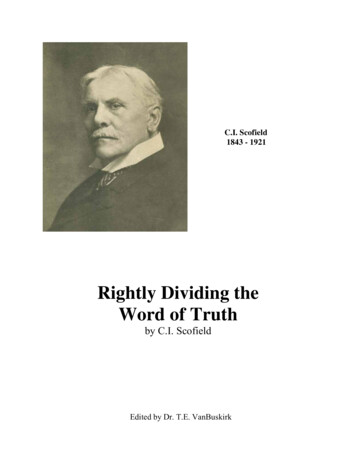
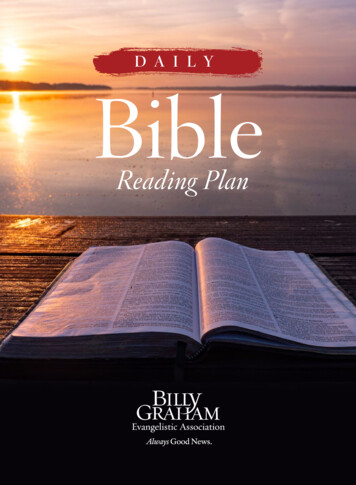

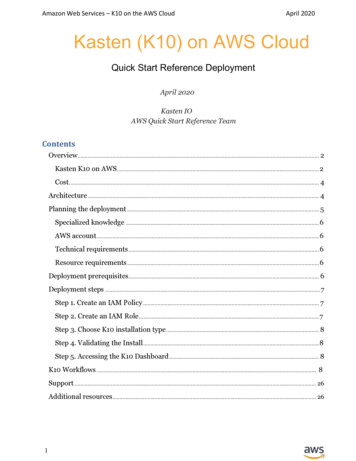
![Index [beckassets.blob.core.windows ]](/img/66/30639857-1119689333-14.jpg)


